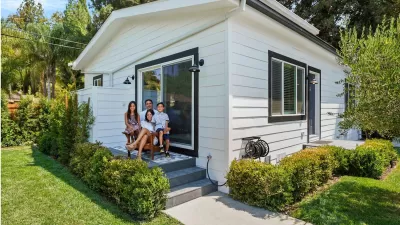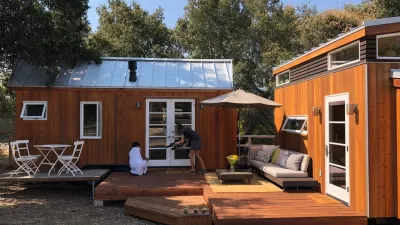Although state-level laws are making it easier for homeowners to build accessory dwelling units, high impact and development fees remain a major barrier for many prospective ADU builders.

While many states are liberalizing regulations related to accessory dwelling units (ADUs) to make ‘granny flats’ easier to build, “local governments remain the key gatekeepers when it comes to ADU liberalization,” writes Mike Koenig in HousingWire.
For Koenig, there’s still work to do to ensure property owners around the country can easily and affordably build backyard cottages or other add-on units on residential lots that can help gently increase density and improve housing affordability.
“As state legislatures continue to press municipalities to ease or remove ADU-related restrictions (13 and counting have done so), utility and other fees—collectively known as impact fees—move toward the center of pro-ADU policy discussions. That’s because impact fees can add up to more than enough to stifle ADU development.” Koenig recommends a few ways cities can ensure their regulations aren’t limiting ADU production, including prorating impact fees and waiving certain development fees.
Koenig points out that the higher density created by ADUs can bring long-term benefits to the community beyond housing affordability, including higher tax revenues. But while costs and other barriers remain high, “States and municipalities have come a long way in smoothing the paths forward for those who hope to add vital infill housing through ADUs.”
FULL STORY: Opinion: States are making ADUs easier to build. Now it’s up to municipalities to follow suit.

Alabama: Trump Terminates Settlements for Black Communities Harmed By Raw Sewage
Trump deemed the landmark civil rights agreement “illegal DEI and environmental justice policy.”

Study: Maui’s Plan to Convert Vacation Rentals to Long-Term Housing Could Cause Nearly $1 Billion Economic Loss
The plan would reduce visitor accommodation by 25% resulting in 1,900 jobs lost.

Planetizen Federal Action Tracker
A weekly monitor of how Trump’s orders and actions are impacting planners and planning in America.

Waymo Gets Permission to Map SF’s Market Street
If allowed to operate on the traffic-restricted street, Waymo’s autonomous taxis would have a leg up over ride-hailing competitors — and counter the city’s efforts to grow bike and pedestrian on the thoroughfare.

Parklet Symposium Highlights the Success of Shared Spaces
Parklets got a boost during the Covid-19 pandemic, when the concept was translated to outdoor dining programs that offered restaurants a lifeline during the shutdown.

Federal Homelessness Agency Places Entire Staff on Leave
The U.S. Interagency Council on Homelessness is the only federal agency dedicated to preventing and ending homelessness.
Urban Design for Planners 1: Software Tools
This six-course series explores essential urban design concepts using open source software and equips planners with the tools they need to participate fully in the urban design process.
Planning for Universal Design
Learn the tools for implementing Universal Design in planning regulations.
Caltrans
Smith Gee Studio
Institute for Housing and Urban Development Studies (IHS)
City of Grandview
Harvard GSD Executive Education
Toledo-Lucas County Plan Commissions
Salt Lake City
NYU Wagner Graduate School of Public Service





























